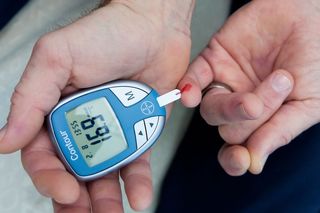Depression
Diabetes and Depression: Which Comes First?
These two illnesses have more in common than you probably realize
Posted February 4, 2019

Diabetes is now an epidemic in the United States. About one-third of the US population has either diabetes or pre-diabetes! It is well established that people who have diabetes are at much higher risk of developing clinical depression – about double the risk of people who don’t have diabetes. What is much less appreciated is that people who start off with depression, with normal blood sugars at the time, are at much higher risk of developing diabetes in the future – the rates are about 60% higher than in people without depression. Why do these disorders go together so frequently? Is it more than just a coincidence?
First of all, let’s define what we mean by “depression.” We’re not talking about simply feeling bad or tired for a few days. We’re talking about major depressive disorder, or clinical depression – the illness that leaves people feeling depressed or sad most days, that robs them of almost all joy and pleasure in life, that disrupts their sleep, leaves them feeling tired and exhausted, interferes with their ability to work or concentrate, and might even have them contemplating suicide as a way to end their suffering. Clinical depression is all too common, and is now the leading cause of disability in the world!
One of the most popular theories about why people with diabetes have higher rates of depression is that it’s difficult to have diabetes, and maybe the stress of having a chronic illness, with worries about blood sugar levels, diet, and taking pills or insulin injections would leave anyone feeling down, if not downright depressed. Given that diabetes most commonly occurs in those who are overweight or obese, another theory is that our society’s bias against heavy people might take a toll on self-image, and might make getting a job or dating more difficult, which could leave people feeling depressed. While both of these theories may, in fact, play a role in causing clinical depression, it appears that there is much more to this connection than simply stress, society, and psychology.
Inflammation is found in both disorders. In fact, inflammation in the bloodstream has been found in many chronic disorders, including both diabetes and clinical depression. No one knows for sure what is causing this inflammation, and we don’t yet know if it is causing these disorders, or simply a consequence of these disorders. In other words, it’s possible that inflammation causes both depression and diabetes, or having diabetes or depression causes the inflammation. Clearly, there’s more to the story than just inflammation - otherwise, everyone with it would develop both diabetes and depression. However, if inflammation is a risk factor for both disorders, it’s not at all surprising that these disorders go together, and this would point to a biological reason for the overlap in disorders, as opposed to simply a psychological reaction to being overweight or having diabetes.
Cortisol is another factor. We know that cortisol is often elevated in people with depression, and we also know that cortisol worsens blood sugar levels and insulin resistance, so this may also be a factor in how depression can make diabetes more difficult to control.
Does the overlap of these disorders really matter?
Unfortunately, all too often, medical professionals assume that it doesn’t – they assume that people simply have two different disorders that really have nothing to do with each other. In reality, people who have diabetes are not only twice as likely to develop depression, but when they do, on average, it lasts 4 times longer than in people without diabetes – 92 weeks vs 22 weeks. That’s almost two years of suffering from depression, even when getting treatment! Likewise, depression can affect diabetes. When depression occurs in people with diabetes, their blood sugar control gets much worse – they tend to have higher blood glucose readings, worse insulin resistance, and higher rates of diabetes complications, such as blood vessel damage. Some people assume that this is because people who are depressed might eat more junk food to comfort themselves, or may not have enough energy to take care of themselves. While these might be true, it’s also possible that the inflammation from having clinical depression also worsens their diabetes, and that it’s truly a physical thing, not a mental thing or a matter of willpower.
What to do?
1. If you have diabetes, be aware that you are at higher risk for developing clinical depression, and seek help if you notice these symptoms. All too often, people ignore them, and assume they are just getting older and running out of steam. Your primary care doctor can help assess if you have clinical depression, and can likely start appropriate treatment.
2. If you have clinical depression, know that you are at risk for developing diabetes, which could make your depression even worse. Routine screening of your blood sugars can be helpful. If you have depression that is not getting better with current treatments, you should get checked for diabetes to see if this might be contributing to your poor response to treatment.
3. Consider a change in diet. There is some evidence that the Mediterranean diet can help improve both diabetes and mood, even in people with chronic depression. The Mediterranean diet emphasizes more whole foods and eliminates processed foods and junk food, which may be enough of a dietary change for some people. Alternatively, diets low in carbohydrate and higher in fat, such as the ketogenic diet, have shown more dramatic results, even reversing diabetes in a study of over 300 diabetics, and this can help improve mood and energy as well. If you have diabetes, however, you should consult your doctor before trying a ketogenic diet, as your medications and/or insulin will need to be reduced rapidly due to the powerful effects of this diet.
4. Exercise! There is abundant evidence that exercise can help both diabetes and depression. It’s a new year, so if you haven’t already started a new year’s exercise routine, time to start now. You don't need to start at a gym if that makes you uncomfortable - you can start with short walks and work your way up to longer walks and short jogs along the way. If your knees can't handle that, think about swimming, cycling, yoga, or a myriad of other ways to move your body and get your blood flowing. If you have severe diabetes and haven't exercised in years, talk to your doctor first about starting safely.




